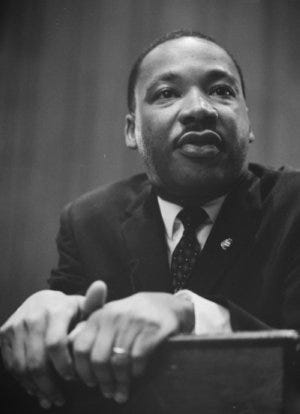5 Lessons from MLK on Living, Leading, & Communicating
Martin Luther King, Jr. left us a legacy. He taught us as much through what he did as through what he said. (Maybe more.) One of the many lessons Dr. King exemplified was the effectiveness of a life lived out loud — one in which a person's words are bac

Photo credit: Mike Licht (Creative Commons)
Martin Luther King, Jr. left us a legacy, teaching us as much through what he did as what he said. Maybe more.
One of the many lessons Dr. King exemplified was the effectiveness of a life lived out loud, one in which a person's words and dreams are backed by considerable action.
He showed us our lives must be lived intentionally and without regret, that words mean something and we must speak up in the face of injustice.
He taught us that it is one thing to say you have an idea and quite another to act on it. And the man's courage still inspires millions of people today.
I'm glad Dr. King spoke up and then acted. The world is a better place because of it. Here are five lessons we learn from this pioneer of civil rights (all quotes from Dr. King).
Speak with conviction
Cowardice asks the question, is it safe? Expediency ask the question, is it politic? Vanity asks the question, is it popular? But conscience ask the question, is it right? And there comes a time when we must take a position that is neither safe, nor politic, nor popular, but one must take it because it is right.
Words ring hollow when you declare something with wavering, weak words. When your message lacks conviction, we notice. It would be better for you to say nothing than to mutter a few wimpy phrases followed by parenthetical caveats and exceptions. MLK never spoke like this. He understood that if you are going to change things, you will need to be bold.
Your words, as well as your life, will have to reflect this. You may have to say something that is hard. You may be required to challenge the status quo or even hurt someone's feelings -- not intentionally, of course, but because not doing so would be a disservice to the truth.
So when that time comes, be absolutely sure of what you say before you say it. And then, say it. With boldness and conviction, as well as sensitivity and grace. But make no mistake: You must speak up. No pussyfooting about it.
Our stories are intertwined
All I'm saying is simply this, that all life is interrelated, that somehow we're caught in an inescapable network of mutuality tied in a single garment of destiny. Whatever affects one directly affects all indirectly.
We cannot attempt to live, or tell, a compelling story without being conscious of others. Everything we do is affected by and has an effect on other people.
We are in this together. Until we realize this, we are not living to our fullest potential. We are, instead, aimlessly and irresponsibly wandering. Until we start telling stories that unfold symbiotically, we are not telling truth. We are simply reciting fairy tales.
We need more honest stories that call us into a deeper reality. This is where we all long to live, isn't it? It begins with compassion.
Telling the truth is dangerous
In the end, we will remember not the words of our enemies, but the silence of our friends.
There is nothing safe about being honest, nothing comfortable about doing the right thing. If anything, when you are committed to saying what needs to be said, it will likely get you into trouble. But the fruit is worth the pain.
You're the one who has to decide this, though. Choose wisely before opening your mouth, and be aware of the consequences. Because as with MLK, this may cost you your life.
But of course, if you don't speak, it could cost you something far greater.
Your goal should never be popularity
A genuine leader is not a searcher for consensus but a molder of consensus.
It is a dangerous thing to strive for the popular vote.
As a leader, you will be asked to compromise all kinds of values to please others. Sometimes, this is good; it teaches you flexibility and humility. But the practice of consensus-building can be very, very bad. Steve Jobs showed us this: People don't know what they want or need until you show it to them.
If you are offering a new paradigm, you cannot assume the masses will know or care what you're talking about. You have to show your audience the Promised Land before they'll want to go there themselves.
You can use this information to coerce people or help them. It's up to you. Whatever you do, beware the temptations of flattery. If all you're doing is following the status quo, you're not leading. You're entertaining.
The first person you need to convince is yourself
Faith is taking the first step even when you don't see the whole staircase.
MLK often spoke about the importance of believing in yourself before trying to convince others to do so. He knew that if we doubt ourselves, so will others. He also knew human beings cannot act according to their identity until they believe it about themselves.
In the field of creative disciplines, we see this to be especially true. "A writer is a writer when he says he is," says Steven Pressfield.
There's something about the power of declaration via our voices that forces our hands to act. This may be the most important lesson Dr. King taught us: we are what we are when we decide to be it.
May we honor MLK's memory by boldly being and believing who we are, then acting on it.
What lessons have you learned from the life and legacy of MLK? Share in the comments.

